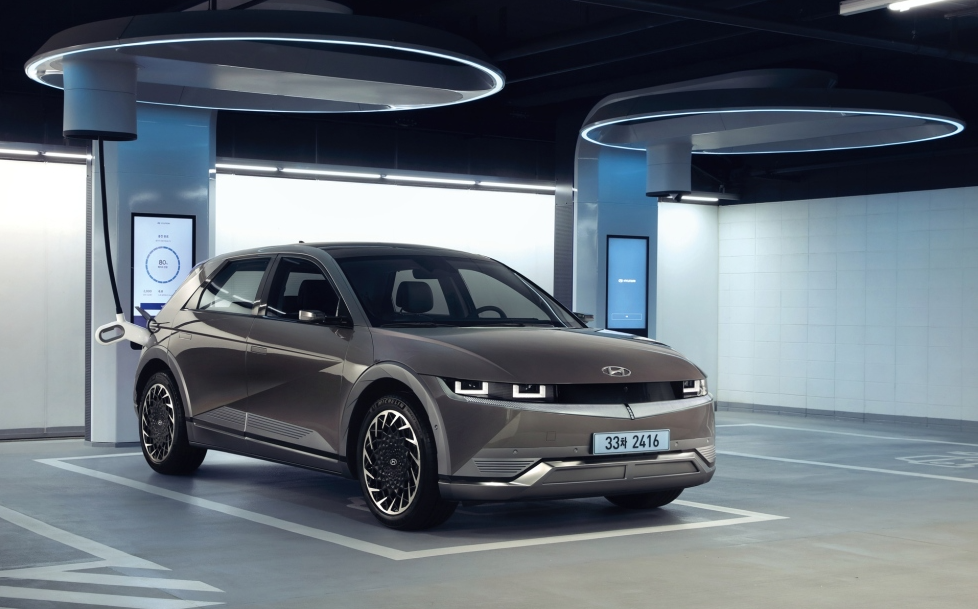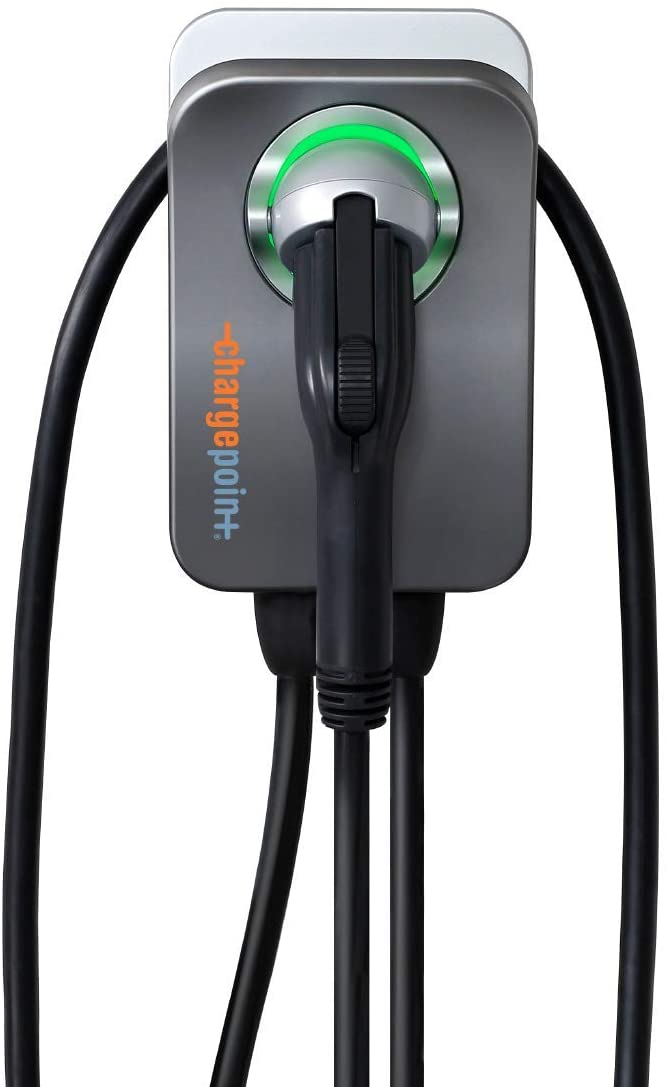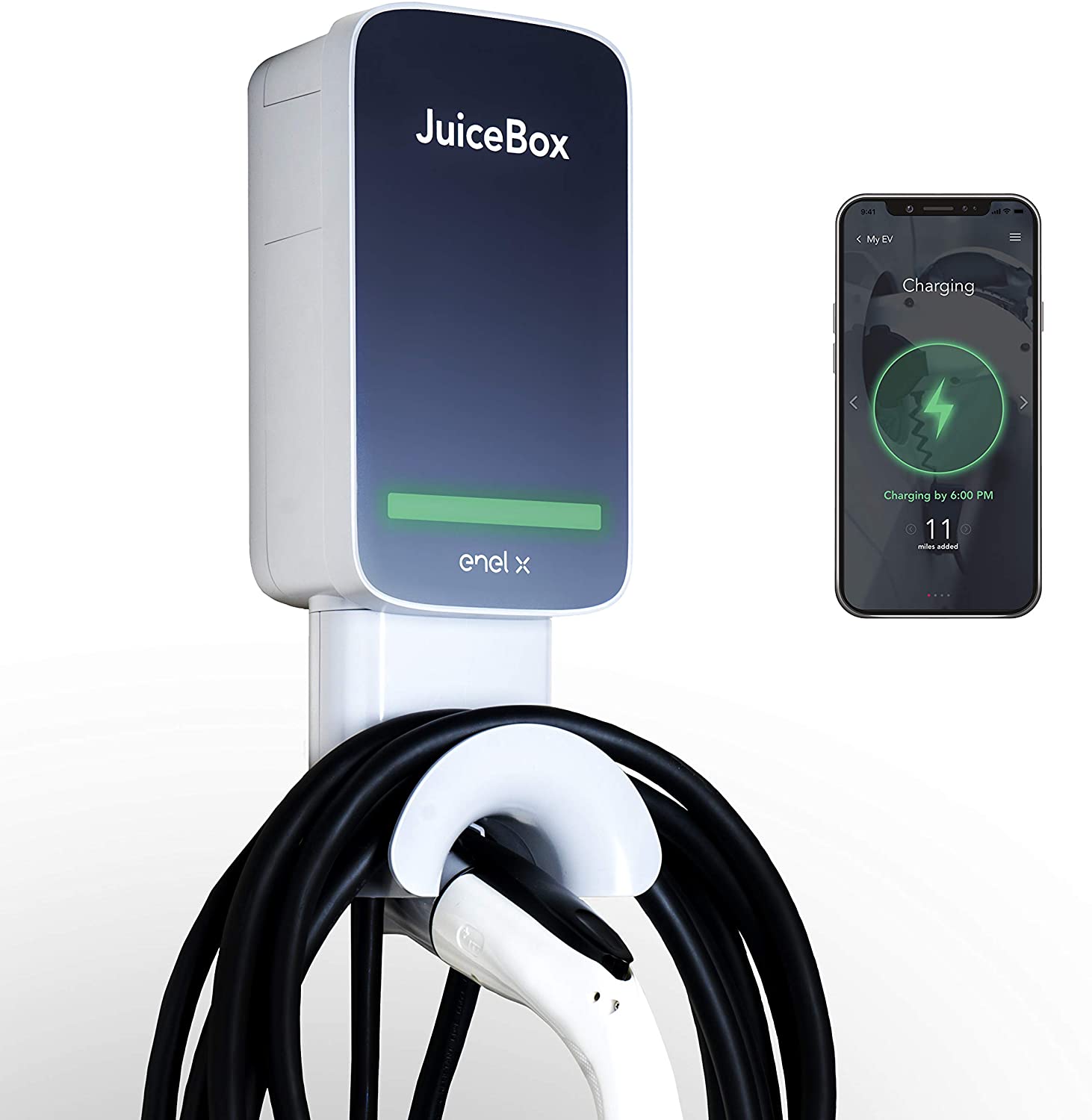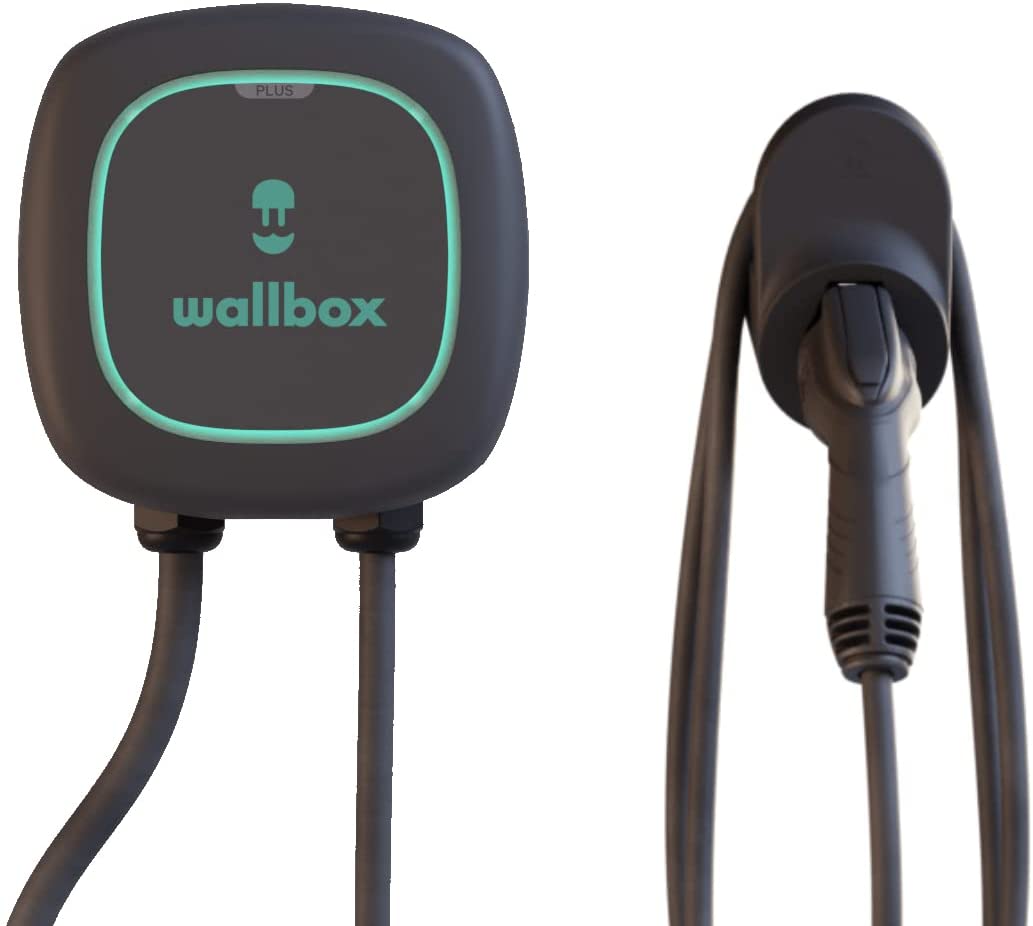We review 3 Hyundai Ioniq Home Chargers which we consider to be worth buying at the moment. All of them can match or get close to the Ioniq’s maximum on-board charging rate and some of them offer unique smart features.

| Product | Amp rating | Level | Cable Length | Nema | Power | Price |
|---|---|---|---|---|---|---|
ChargePoint Home Flex – Level 2 EV Charging Station (16-50 Amp)  | 16 – 50 Amp | Level 2 | 23 Feet (7 M) | NEMA 14-50 & NEMA 6-50 | 12 kW | Click for more info |
ENEL X JuiceBox 40 – Level 2 EV Charging Station (40 Amp)  | 40 Amp | Level 2 | 25 feet (7.6 m) | NEMA 14-50 | 10 kW | Click for more info |
Wallbox Pulsar Plus – Level 2 EV Charging Station (48 Amp, 11 kW)  | 16 – 48 Amp | Level 2 | 25 feet (7.6 m) | Hardwired | 11.5 kW | Click for more info |
Let’s have a look at each product in particular.
ChargePoint Home Flex – Level 2 EV Charging Station (16-50 Amp)
| Product | Amp rating | Level | Cable Length | Nema | Power | Price |
|---|---|---|---|---|---|---|
ChargePoint Home Flex – Level 2 EV Charging Station (16-50 Amp)  | 16 – 50 Amp | Level 2 | 23 Feet (7 M) | NEMA 14-50 & NEMA 6-50 | 12 kW | Click for more info |
Now in terms of the charging time, we know that the Ioniq’s on-board AC charger can take a charging rate of up to 12 kW which is exactly what the ChargePoint can offer. For it to get up to full power, you’ll need to hardwire it to a 60-Amp circuit breaker. But you can also plug it in and available connector types include NEMA 14-50 and NEMA 6-50.
But what matters to you is not the kW but the time it takes for charging your EV. You should be able to charge the 58 kW standard range version from 20% to 100% in about 4.5 hours and the 77.4 kWh extra-long range version should require about 6 hours for charging the vehicle in the same conditions.
This home charger comes with a J1772 plug which is compatible with most EVs in North America and Wifi connectivity together with a smartphone app so you can control it remotely. It can also integrate with Amazon’s Alexa so that you can ask it things like “How much have I spent on charging my EV this month?”. Of course it has features like charge scheduling to help you take advantage of off-peak energy prices, something which has become more important lately.
The Chargepoint app is well designed, it is the same one that you use to find public charging stations. This EV charging station only has a NEMA 3R rating so we recommend you install it inside a garage rather than outside since it is not fully waterproof. Each unit also comes with a 3-Year warranty.
ENEL X JuiceBox 40 – Level 2 EV Charging Station (40 Amp)
| Product | Amp rating | Level | Cable Length | Nema | Power | Price |
|---|---|---|---|---|---|---|
ENEL X JuiceBox 40 – Level 2 EV Charging Station (40 Amp)  | 40 Amp | Level 2 | 25 feet (7.6 m) | NEMA 14-50 | 10 kW | Click for more info |
Just like the ChargePoint, it uses a J1772 so it’s fully compatible with all EVs on the market and this includes the Ioniq of course. It comes with a 25-foot cable and can be plugged into a NEMA 14-50 connector or hardwired directly, depending on what you prefer. There’s a smartphone app with wifi connectivity to help you keep track of your charging costs, set a complex charging schedule or just start and stop it remotely. They even put in a feature that tells you how much CO2 you’ve saved since you’ve owned the charger.
The JuiceBox can do something the former can’t and that is Power Sharing, so you if you have two of these chargers hooked up to the same circuit, they’ll distribute power evenly so it doesn’t overload the circuit itself. If the power goes out, the unit restarts itself automatically.
Another big advantage is the fact that it is NEMA 4X rated (IP66 equivalent) so it can withstand water, dust and fire. Every JuiceBox comes with a 3-Year warranty. Personally, I like the design of the unit more than the ChargePoint but that is down to personal preference.
Wallbox Pulsar Plus – Level 2 EV Charging Station (48 Amp, 11 kW)
| Product | Amp rating | Level | Cable Length | Nema | Power | Price |
|---|---|---|---|---|---|---|
Wallbox Pulsar Plus – Level 2 EV Charging Station (48 Amp, 11 kW)  | 16 – 48 Amp | Level 2 | 25 feet (7.6 m) | Hardwired | 11.5 kW | Click for more info |
It’s fast charging rate comes from the fact that it can deliver 48 Amps of electrical current at a rated power of 11.5 kW. Now in order to achieve this, you need to hardwire it to a 60-Amp circuit breaker, there is no NEMA connector. The 25-foot charging cable that plugs into your electric car or plug-in hybrid uses a standard SAE J1772 connector.
In terms of how long it takes to charge the Hyundai Ioniq, you can take the Chargepoint’s times as reference, so 4.5 hours for the standard version and 6 hours for the long range. So basically you’ll be sleeping more time than it takes to fully charge your EV.
The Wallbox not only has Wifi but also Bluetooth connectivity. It’s packed with smart features like power sharing but also a solar excess feature which lets you take full advantage of solar energy. The way it works is that when solar panels are producing excess energy, that can be used by the charger and it only starts when that excess is created, basically avoiding the grid almost completely. The smartphone app is well designed, you get charts showing you how much you’ve spent on energy each day and there’s also Alexa integration. You can also set custom charging schedules for each day of the week.
This home charger is IP54 rated, so you can install it outside and it will sit in the rain and charge without any issues. Each Wallbox unit comes with a 3-Year warranty from the manufacturer. There’s also a 40-Amp version which comes with a standard NEMA connector which will achieve the same charging times as the Enel JuiceBox which we talked about here.
Our Score
